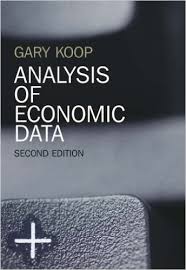Analysis of Economic Data (2nd Ed.) by Gary Koop
$25.00

Analysis of Economic Data (2nd Ed.) by Gary Koop
Get Analysis of Economic Data (2nd Ed.) by Gary Koop at Salaedu.com
Analysis of Economic Data teaches methods of data analysis to students whose primary interest is not in econometrics, statistics or mathematics. It shows students how to apply econometric techniques in the context of real-world empirical problems. It adopts a largely non-mathematical approach relying on verbal and graphical intuition and covers most of the tools used in modern econometrics research e.g. correlation, regression and extensions for time-series methods. It contains extensive use of real data examples and involves readers in hands-on computer work. The new edition includes new material on the mathematical background required by students and, for those readers unfamiliar with this background, a brief explanation of the relevant mathematics. Topics covered include: the equation of a straight line, the summation operator, and logarithms. The author also includes a much greater discussion of data transformations such as growth rates and index numbers. More material will also be added on data sources, largely focusing on internet data sources.
- Gary Koop has a very high international profile in the field of econometrics and is well known for his books and numerous journal publications.
- The second edition provides stronger coverage of the relevant introductory mathematics, including: the equation of a straight line, the summation operator, and logarithms. This will make the book more accessible for those students who have limited mathematical skills.
- Greater discussion is also provided of data transformations such as growth rate and index numbers. Index numbers are becoming increasingly important and are frequently used in economics courses.
- More material will also be provided on data sources, especially internet data sources which are becoming extremely important as a means of gathering data. Some students have difficulty with the collection of data and the inclusion of this material will help those students.
Review
“The striking & highly commendable feature of the text is the intuitive approach. It is a rare textbook that can be read from cover to cover sustaining the reader ‘s interest.”, , , THES# –This text refers to an out of print or unavailable edition of this title.
From the Back Cover
This revised and updated second edition of Analysis of Economic Data builds upon the success of the first edition in teaching methods of data analysis to students whose primary interest is not in econometrics, statistic or mathematics, as well as students who are facing economic data analysis for the first time. It shows students how to apply econometric techniques in the context of real-world empirical problems.
Key features include:
- A clear departure from traditional econometric textbooks, relying less on mathematics and more on verbal intuition and graphical methods for understanding.
- Covers most of the tools and models used in modern econometrics research e.g. correlation, regression and extensions for time-series methods.
- Contains extensive use of real data examples and involves readers in hands-on computer work.
New content includes:
- Coverage of the mathematical background required by students and, for those unfamiliar with this background, a brief explanation of the relevant mathematics.
- A much greater discussion of data transformations such as growth rates and index numbers.
- More material on data sources, largely focussing on Internet data sources.
A website containing information for instructors and students alike, including data sets, PowerPoint slides, web-based tutorials, sample exam questions and answer sheets for problems in the book, can be found at www.wileyeurope.com/go/koopdata2ed.
About the Author
Gary Koop is Professor of Economics at the University of Leicester.
Get Analysis of Economic Data (2nd Ed.) by Gary Koop at Salaedu.com
1 review for Analysis of Economic Data (2nd Ed.) by Gary Koop
Add a review Cancel reply
Related products
Forex - Trading & Investment
Pristine – Oliver Velez – Core, Swing, Guerrilla, Momentum Trading, Micro Trading Tactics
Forex - Trading & Investment
Forex - Trading & Investment
Forex - Trading & Investment
Pristine – Paul Lange – Creating & Using a Trading Plan + Seven Steps to a Good Trade
Forex - Trading & Investment
Nick Van Nice & John Sheely – Master CTS Swing Trading (Video & Manual)
Forex - Trading & Investment
Pristine – Oliver Velez & Greg Capra – Trading the Pristine Method. The Refresher Course – I & II










Trevis Trevis –
We create this shop with the mission: Bring the courses to 500 millions of people in the world, to help them awake their power and change their